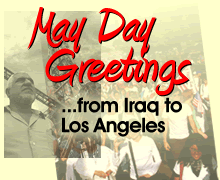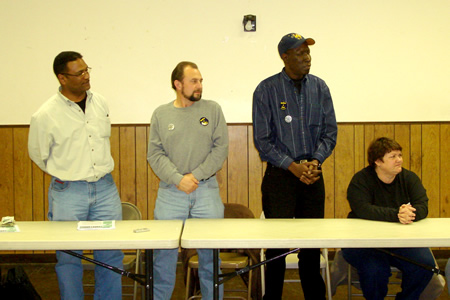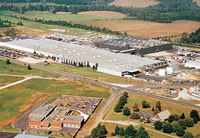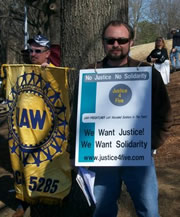Posted April 30, 2008

Although it is not officially celebrated in the United States, May 1, International Workers’ Day, has its roots in the early US labor movement. In 1886, workers across the country struck for the eight-hour day, and in Chicago, a May 4 rally at Haymarket Square turned violent. Eight anarchists were tried for murder and four were put to death. In their honor, socialists and workers organizations worldwide began celebrating the acheivements and vision of labor on May Day. Click here to read the words of Iraqi unionists and an editorial by Nativo Lopez, a leader in the immigrant movement.
Justice for the Freightliner Five!
Five members of the UAW Local 3520’s bargaining committee at Freightliner LLC, a truck manufacturing plant, owned by Daimler need your help. The Freightliner Five were fired a year ago for leading a strike in their plant over health, safety and other issues. May 9th is an international day of action for the Freightliner Five. Join them in Cleveland, NC for an 11AM rally in Cleveland Park OR organize solidarity actions at Freightliner/Daimler locations. Demand immediate reinstatement of the five with full back pay.
** Download and distribute the flier for May 9 action to support the Freightliner Five!
Although Freightliner opened the plant in Cleveland, a small town in “right-to-work” (for less) North Carolina, almost twenty years ago it wasn’t until 2002 that the workers there got seriously interested in a union. Workers had just taken a $1.15 an hour pay cut to cover their health care. However a UAW-recognized plant in nearby Mount Holly were protected by a contract, and therefore didn’t have their wages slashed. So when the UAW held a meeting three months later, workers in Cleveland attended. A core of workers set up a volunteer organizing committee, working out of the Methodist Church and planned an effective campaign that led to union recognition. Four of the Freightliner Five were members of that volunteer committee: Allen Bradley, Glenna Swinford, Franklin Torrence and Robert Whiteside. (The fifth member, David Crisco, joined the union later.)
Because of a merger a few years before, Freightliner’s parent company had already agreed to recognize the union when a majority signed authorization cards. The organizing committee didn’t know that a five-year neutrality agreement also guaranteed that when they came to the bargaining table there would be certain restrictions: no profit sharing, no cost-of-living wages, and no restrictions on overtime. So the committee did the best they could under the circumstances, and looked forward to the second contract.

Last spring when the local bargaining committee began to negotiate for a new contract, they found themselves hamstrung by Freightliner. By the time contract expired March 31st, the committee wasn’t close to a tentative agreement. The company told the committee to take the economic package back to the membership for a vote, saying that the unresolved issues, including health and safety grievances, would be discussed after the ratification process. The bargaining committee felt they couldn’t bring back a partial contract. The package was loaded with concessions, including the fact that half the membership wouldn’t have gotten a raise. There would be a two-tier health care plan whereby new hires would have a lesser level of retirement care than current employees. Retirees’ health care would also become more restrictive under the new contract.

The UAW International staff working on the negotiations left town for Easter vacation. They said that the company would extend the contract—but Freightliner disputed that when they cancelled the Good Friday holiday. Workers reported they’d been told their health insurance was cancelled.
Members felt only a strike would get the company back to the bargaining table; on April 2nd the bargaining committee voted to strike. They conferred with the local president, who supported the decision, and asked him to activate the union’s phone tree. Then they went into the plant and explained that the International had not sanctioned the strike, but that there was no contract and therefore it was not an illegal action. The strike was on!
However the president sent a message out to the membership that the strike was illegal and members should report to work the following morning, thus aborting the strike.
On April 3rd the local received a fax from the UAW International saying they had secured a contract extension. By April 18 a contract without the health care concession was submitted to the membership, but rejected. Then the UAW Region 8’s director sent out a flier to every member’s home and a re-vote scheduled. The contract passed the second time around.
Five members of the bargaining committee were fired for stopping production. Additionally six workers who walked off the job that night were also fired. Subsequently reinstated without back pay they are still being harassed by management.
Over the last several months, the Freightliner Five—three of whom are also on the local’s executive board—have spoken at union and community meetings throughout the country. They know that they will be unable to win their case against Freightliner unless they get national and international support from their union brothers and sisters. Their arbitration case will probably occur this June.

Last November the UAW local heard internal charges against them for leading an unauthorized strike; they were found not guilty. Then this February they were forcibly removed from a monthly membership meeting under the pretext that they had not properly informed the secretary that they wished to remain members, and owed dues. Allen Bradley was arrested as he left the union meeting. His crime? Taking a photo of a police officer.
Despite this harassment, the five are solid trade unionists who want to win back their jobs and continue to build a militant local. All five are members of the NAACP, and Franklin Torrence is president of the first chapter of the Coalition of Black Trade Unionists in North Carolina and a member of the A. Philip Randolph Institute. He is chair of the local’s civil and human rights committee, Glenna Swinford is co-chair. Bradley, as skilled trades chair, along with committeepersons Whiteside and Crisco have focused on dealing with the plant’s serious health and safety issues.
These five people are the kind of folks needed to help organize the South. They are effective and knowledgeable, and they need your support. Come to the rally in Cleveland, NC or take action in your own area.
For more information about the Freightliner Five, go to www.justice4five.com.
